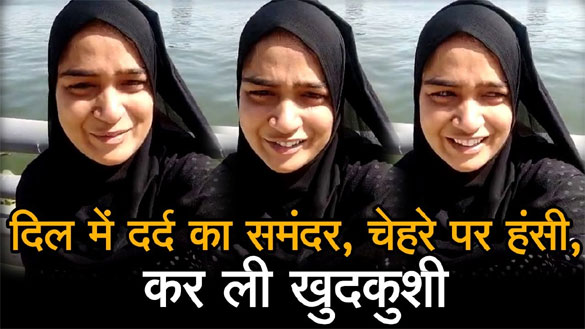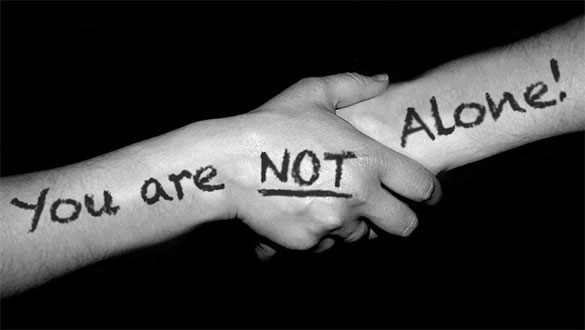Muslim Preachers Must Introspect On How to Curb Suicide and Murder in the Muslim Community

By Ghulam Ghaus Siddiqi, New Age Islam
9 March 2021
Ayesha Arif Khan’s Suicide and Sayed Mental’s
Killing His Wife and Daughters with a Hammer
Taking one's own or another's life in depression,
anxiety, enmity, dispute, or otherwise has become a routine affair worldwide.
Geographical, racial, sectarian, religious, marital, be it at any level, it
needs to be curbed, primarily on the humane ground and value. The major factor
in this connection may be lack of education or the non-practicing of what is
taught in the educational programs relating to the characteristic and
behavioural values on how to treat wife, daughters and the human fellows, beyond
the shackle of prejudice, immorality, injustice, oppressive power and low
attitude. The lack of education, or the non-practicing behaviour, predominantly
rooted in our multicultural society, is a challenging but not an impossible
task ahead of us. Thereby we must work for social awareness, propagate human
ethos and relevant religious teachings to eradicate this social evil, that is,
taking one's or other's life.

For the case study of the subject, two
examples can be taken. One of them is the incident of Ayesha’s (23) taking her
own life by way of suicide, and the other is that of Sayed Mental’s (60)
hammering to death his wife Safeela (50) and two daughters Rajia (20) and
Shabana (15) while the third daughter Sultana (18) is battling for life in the
hospital. In both the examples, either of the two reasons; lack of religious
education or the non-practicing upon the religious information can be traced.
---------------------------------------------------------------------------------
---------------------------------------------------------------------------------
Ayesha is reported to have suffered torture
and harassment due to dowry or her husband’s illicit affair with another girl,
the case of which still needs to be properly investigated by the police, and
hence we are not sure enough to describe the exact sort of harassment which
compelled her to commit suicide. Our point of discussion is beyond judging the
nature of harassment that compelled Ayesha to commit suicide. Not even can we
call Ayesha back to life but raise a question; can her suicide be justified
under any such pressing circumstances? The simple answer is: ‘No, It can’t be
justified. If it can’t, then why did Ayesha commit her suicide? Had she, being
a Muslim lady, a lack of religious education which definitively forbids
suicide, or did she deliberately commit suicide, despite knowing the fact that
it is strongly prohibited to commit suicide in Islam under all circumstances,
dowry pressure or otherwise?
Another incident, which is related to Sayed
Mental’s killing his wife and daughters, narrates the act of brutality
inflicted not just upon his family but also upon Islam in the sense of
disrespecting the divine command which forbids taking other’s life unjustly.
Again the same question can be repeated here for Muslim community; can Sayed
Mental’s killing his family be justified? Their answer would be in
negation. But why did Sayed Mental take his step towards killing his
family, due to lack of religious education or non-practicing behaviour?
These questions related to both the incidents
will definitely lead to represent the shortcoming within the Muslim community
in general. That shortcoming could be either lack of religious education or the
act of not practicing the religious command that vehemently lays emphasis on
the value of one’s or other’s life as a blessing of Allah Almighty. Both the
incidents indicate that Muslims are living either with a lack of religious
education or have become non-practicing. If it is reported that some Muslims
are aware of Islamic teachings and that they are practicing Muslims too, then
they can’t deny the fact that they have failed to curb the growing evil of
taking one’s own life by suicide and another’s life by unjust killing.
Ayesha’s life was, above all, a blessing of
Allah Almighty, which she should not have wasted by committing suicide. She
could have intended to maintain safety for this God-gifted blessing in several
possible ways. For the sake of her so-called lover, she could not seek to
uphold her love to Allah Almighty Who endowed her with the blessing of life.
She could have loved her life just for obeying the following commands of Allah
Almighty and the sayings of the Prophet peace be upon him,
“Do not kill yourself” (4:29) “But whoever
will do that through transgression and injustice, we shall soon throw him into
the Fire (of Hell) and that is very easy for Allah” (4:30).
This verse denotes the value of life by declaring
all types of suicide forbidden. Hence a believer is not permitted to commit
suicide, whether to take one’s own or another’s life.
In another verse, Allah Almighty says,
“And do not cast yourselves into destruction with
your own hands, and adopt righteousness. Verily, Allah loves the righteous” (2:195)
The Prophet Muhammad (peace and blessings of
Allah be upon him) said, “The one who commits suicide will go to Hell, and will
keep falling into it and will abide there forever” (Sahih Bukhari,
The book of Medicine, Chapter: Taking poison and using it for medical treatment
or using what may be dangerous or Impure)

Narrated Hadhrat Abu Hurairah
(Allah is pleased with him) that the prophet Muhammad (peace and blessings of
Allah be upon him) said, “Whoever stabs himself to death will continue to stab
himself in Hell. And whoever throws himself off a cliff will continue to throw
himself off a cliff in Hell. And whoever hangs himself will continue to hang
himself in Hell”. (Sahih Bukhari, The book of Funeral Rites,
Chapter: What has come to us about someone who kills himself’?)
Hadhrat Abu Hurairah reported that the
Messenger of Allah Almighty (peace and blessings of Allah be upon him) said:
“Whoever purposely throws himself from a mountain
and kills himself, will be in the (Hell) Fire falling down into it and abiding
therein perpetually forever. And whoever drinks poison and kills himself with
it, he will be carrying his poison in his hand and drinking it in the (Hell)
Fire wherein he will abide eternally forever; and whoever kills himself with an
iron weapon (stabbing himself), will be carrying that weapon in his hand and
stabbing his abdomen with it in the (Hell) Fire wherein he will abide eternally
forever.” (Sahih Bukhari, The book of Medicine, Chapter: Taking
poison and using it for medical treatment or using what may be dangerous or
Impure)
The afore-mentioned Quranic verses and Ahadith
are stern warnings (wa’eed) for those who intend for committing suicide
for killing themselves or others. We seek forgiveness for Ayesha who committed
a mistake by committing suicide, and indeed Allah is the Most Forgiving and the
Most Merciful.
However, we should make the common Muslim
masses aware of these verses and Ahadith related to the forbiddance of
suicide, in order that they never go to take such an extreme step, whatever the
case may be. Thousands of people including women are suffering from hardships
in several forms; poverty, starvation, injustice, helplessness, and severe
harassment. Despite that, they are living their life with patience and
perseverance because they know suicide is not a solution to their problem. They
are to be heartily saluted because they are facing all their difficulties with
courage, and tantamount to valuing the blessing of life granted by God
Almighty.
With regard to the UP’s Bulandshahr
case in which Sayed Mental killed with a hammer, his wife, and two daughters
whereas his third daughter is battling for life in the hospital, the police are
yet to ascertain what exactly led the father to kill his family, while
villagers told the police that the man often used to beat his wife and
daughters without any reason. The man was reportedly and mentally unsound and
therefore the villagers had added the word Mental to his name. This case can
also be taken to deduce the idea that how far our common Muslim masses have
gone from Islam that they have transgressed all the limits of transgression.
---------------------------------------------------------------------------------
Also read: The Stark Problem of Family Violence: How Does
Islam Resolve It?
---------------------------------------------------------------------------------
One of the objectives of marital relations in
Islam is that love, friendship, peace, and good ties of kinship prevail between
the spouses. It is for this reason that Allah Almighty ordered the husband to
live with his wife lovingly and honourably. He says: “treat them (wives)
honourably”. The context of the verse is about the duty of a husband towards
his wife. In its broader understanding, treating a wife honourably means the
prohibition of violence over a wife. So, a husband in Islam is prohibited to
exercise violence over his wife.
In another verse, Allah the Almighty says,
“Live with them in kindness; even if you dislike them, perhaps you dislike
something in which Allah has placed much good” (Quran, 4:19).
Allah Almighty also says: “Retain
them (wives) in kindness or release them in kindness. But do not retain them
for injury; so that you exceed the limits, and whoever does this, he indeed is
unjust to his own soul” (2:231). The word “Dirar” (ضرار) has
multiple meanings; such as ‘hurt’, ‘injury’ ‘harm’, ‘damage’, ‘detriment’ and
‘wound’ etc. With any of these meanings, it would be fully appropriate to
derive a sense from this verse that practicing any kind of violence over wife
to cause injury or harm or damage is forbidden in Islam.
In addition to the Qur'anic verses,
there are many Ahadith that teach the husband to maintain good ties of
kinship, love, and gentleness for his family. The prophet Muhammad (peace be
upon him) said, “The best among you are those who behave well with their women
(wives) and daughters” (Al-Baihaqi). To be best for wife and daughter in
the modern-day, it is binding upon a husband to keep away from the practice of
violence over his wife and daughter.
Once someone asked Prophet Muhammad (peace
be upon him) what the obligations of husbands towards their wives are. He
replied: "Feed her when you eat and provide her clothing when you provide
yourself. Neither hit her on the face nor use impolite language when addressing
her" (Mishkat Shareef, the chapter on the maintenance of
women).
In another Hadith narrated by Imam
al-Bukhari, the lady Aisha (may Allah be pleased with her) said “the
prophet (peace be upon him) was in the service to his family”. (Bukhari)
The sacred texts of the Qur’an and Sunnah
imply that both husband and wife are obliged to fulfil their respective duties
towards each other. Obedience to each other’s responsibilities is binding upon
them. The spouses ought to take care of each other’s emotions and sentiments.
Their primary purpose must essentially focus on co-operating each other in joy
and sorrow with patience. They should never let themselves be possessed by
anger, as it is unlawful in Islam. Anger destroys the faith of a man and often
breaks even good ties. The Prophet (peace be upon him) said, “Verily anger
spoils faith just as aloes spoils honey” (Al-Tabrani and al-Baihaiqi).
Therefore, the husband and the wife must avoid getting angry, as it causes
nothing but tension, depression, frustration, mental torture, and violence.
Adhering to Islamic teachings is therefore binding upon both of them to bring
prosperity and peace in their married life, and thus to save from every kind of
violence.
Our Islam lays emphasis on maintaining a
good relationship between the spouses and on the value of one’s and other’s
life, by prohibiting the act of unjust killing. But it is the members of the
Muslim community who fear neither the divine punishment on the Day of Judgment
nor the law of punishment enforced by their country. Is this the result of lack
of education or that of not practicing the divine guidance which strongly
prohibits hurting, torturing, and hitting the wife and children? It is the
responsibility of Muslim preachers to ponder over this question for hours and
find out the ways to curb the growing suicide and murder in the Muslim
community and come out of facing further shame.
----
A regular Columnist with NewAgeIslam.com, Ghulam
Ghaus Siddiqi Dehlvi is an Alim and Fazil (Classical Islamic scholar) with a
Sufi background and English-Arabic-Urdu Translator.
URL: https://newageislam.com/debating-islam/muslim-preachers-introspect-how-curb/d/124496
New Age
Islam, Islam Online, Islamic Website, African Muslim News, Arab World News, South Asia News, Indian Muslim News, World Muslim News, Women in
Islam, Islamic Feminism, Arab Women, Women In
Arab, Islamophobia in America, Muslim Women
in West, Islam Women and Feminism
